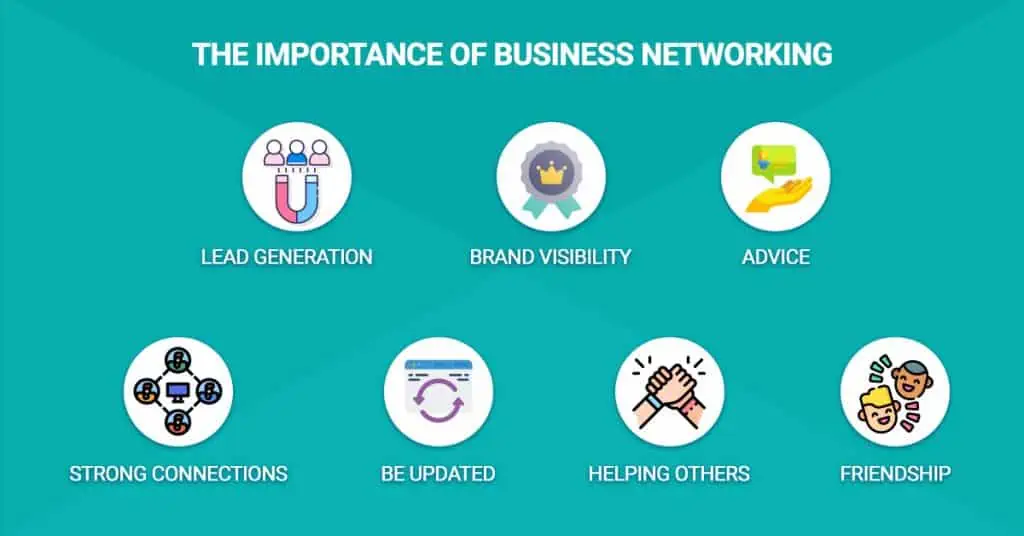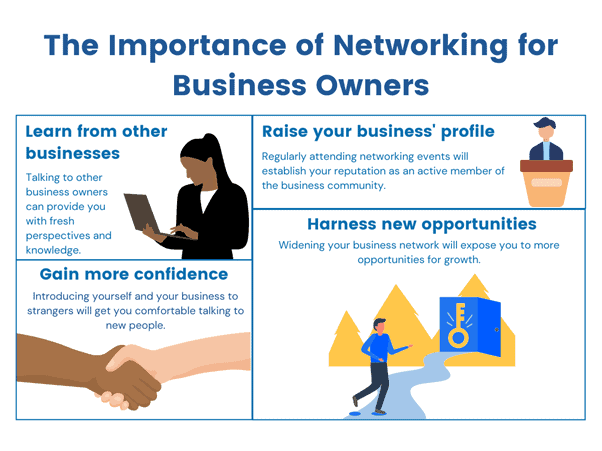Building mutually beneficial connections with other businesspeople and potential clients or consumers is known as business networking. The benefits of business networking are the intangible gains obtained from interacting with other individuals working in or related to your field. Often, a business owner's networking efforts produce the most results in small businesses. Business networking can provide resources for a company's expansion. A top-notch business network may offer prospects for higher revenues, recruitment leads, and insider knowledge of the sector. A company’s success and enhancing your entrepreneurial talents are guaranteed by knowing more fundamental information about business networking.

What Is Business Networking
Business networking is the act of maintaining positive relationships with other business owners, potential suppliers, and other professionals in your industry. Keeping a contact list can help you communicate crucial information, keep up with market developments, and accomplish professional objectives. Additionally, you might share and get helpful career advice and learn about job opportunities. Business professionals frequently look for ways to purposefully increase their network of professional contacts in order to build a strong network.
Networking is the informal social exchange of knowledge and ideas among those who share a profession or a particular interest. Networking often begins with a single point of common ground. Building relationships as a business owner and assisting others give more than potential customers or referrals. You can find prospects for partnerships, joint ventures, or new company endeavours through networking. The main goal of business networking is to spread the word about your company and maybe attract new clients.
Types Of Business Networking
While attending events, keep an eye out for indications that someone might be in a position to benefit your business, where you also have something to offer. This might be a simple conversation on the conditions of the industry’s market and any trends you may have noticed. You may learn more about the market that both of you compete in.
Casual contact networks
These general business groups welcome a wide range of individuals from various overlapping professions. These groups typically meet once a month, and they frequently have informal mixers where people may mingle. Meetings may also be held to discuss legislation and local programs for business or to hear presentations on significant business topics from invited guests.
Casual-contact organizations are not tailored primarily to help you get referrals, and it takes extra effort to make them effective. For instance, you may volunteer to be a chamber ambassador, which involves little time commitment but offers a lot of exposure. By serving as a committee, it helps you know committee members better. Most of all, attending events frequently would provide the advantage of chances to solidify the connections you make.
Casual contact networks are bigger compared to strong contact networks. The groups are simple to join and do not meet as frequently as the ones with a strong contact network. People frequently join them in the same profession, which may not always be a good choice. Nevertheless, we suggest you join one because you might make a connection that can help your business.
Strong contact networks
Strong contact referral groups are associations whose main goal is to facilitate the exchange of business referrals among their members. Some of these groups have weekly meetings, which are usually held over lunch or breakfast. The majority of them only allow one member per profession or specialization.
Strong contact networks offer you and your colleagues highly focused opportunities to start creating your referral marketing campaigns. In this group, you would not meet hundreds of businesses, but every member will take your business cards with them wherever they go. With a program like this, you may build strong, lasting, beneficial relationships.
It is critical to bear in mind that you must have a schedule that allows you to attend all or almost all of the sessions if you are considering joining a strong-contact organization. In order to get to know the other group members and their businesses, regular attendance is essential. You will most likely adore these groups since you will connect with people here more than anywhere else.
Community service clubs
Service groups are not designed primarily for referral networking, in contrast to more business-oriented groups. The primary goal of these networks is community service. Humanitarian causes serve as the foundation for the organizations' work.
By investing time and energy in civic concerns, you build strong connections that enlarge and strengthen your personal and professional networks. If your goal is to contribute rather than gain, your efforts will eventually be rewarded in other ways, which will likely lead to business opportunities.
Professional associations
Members of professional associations tend to be from one particular sector of the industry, such as finance, human resources, accounting, or health. A professional association's main goal is to exchange information and ideas.
When joining such networks, joining groups that comprise your potential clients or target markets is your goal. Asking your best clients or customers which groups they pertain to is a straightforward method for focusing on important demographics.
Those searching for customers or a market for their products can benefit from joining these groups. We suggest that together with trying to sell your goods in these groups, you try to resolve the problems of other members. Being helpful to others is a great way to develop friendships that will probably lead to better business networks.
Online networks
From a business standpoint, giving value to your connections and followers is the best way to develop your brand and credibility with the people you are connected to. Building trust and relationships is still essential to the networking process, whether in person or online.
There are a number of groups online that are solely for business purposes, and they frequently use modern tools like chatrooms to interact with entrepreneurs all over the world. These groups are typically advised for busy businesspeople who may not enjoy travelling to different locations for meetings.
The secret to success with social media is developing a plan that considers how much time you can devote to your online marketing initiatives and consistency. Create a weekly plan that specifies the days and hours you will devote to creating your social media strategy.
Benefits Of Business Networking

Generate business leads, new contacts, and referrals
The most obvious advantage of networking is the chance to meet prospective customers and get referrals, which you can then pursue to grow your client base. Additionally, networking can assist you in finding chances for collaborations, joint ventures, or brand-new company ventures.
Professional networking can assist you in finding new sales possibilities. Business-to-business (B2B) firms that depend on the patronage of other firms to boost earnings may find this to be of particular importance.
Identify key trends
Industries change over time, and maintaining positive relationships with other business experts can help you stay up to date on the most recent information or innovations. For example, a software engineer might use social media to share new coding methods with other programmers.
It is critical to stay current with your industry's overall trends as well as the conditions in your target market in today's dynamic business environment. The secret to creating an effective marketing strategy is understanding the market. You will remain up to date if you regularly attend seminars and network with peers and business partners.
Understand different perspectives
Using the perspectives and experiences of others, networking is the best way to expand your knowledge. If you are considering starting an import or export business, you might be able to get some helpful advice from someone else who has conducted comparable business abroad. Utilizing other people's experiences before you commit time and money to a specific endeavour can be extremely beneficial.
Professionals frequently have different opinions on the best ways to carry out specific duties or plan activities. Speaking with a variety of people in your field could reveal unexpected strategies for enhancing business operations.
Develop your confidence
The majority of businesspeople are upbeat and hopeful. Regularly hanging out with such people can be very uplifting, especially during the challenging early stages of a new company. If you are not typically outgoing, regularly meeting new people can boost your confidence and help you make new friendships with people who share your interests.
You can learn to trust your business strategies and intuition by sharing your business ideas. As a result, you might pursue more career possibilities and raise your chances of forging long-lasting bonds with colleagues.
Increase brand awareness
Other professionals may better understand a company's purpose and values by knowing your ideas and strategies. Since they might rely on their marketing initiatives to find new projects, this may be particularly important for creative professionals marketing their work to prospective new clients.
You must meet and speak with prospective customers and business partners frequently to keep up your business relationships. Business luncheons and other networking opportunities help you build your brand and keep you top-of-mind with the appropriate people.

Effective Business Networking
Look for the right people
Connect with professionals who can provide the precise assistance you require. For instance, talk to friends or colleagues who are involved in that sector if you are interested in exploring business opportunities in a new field. Otherwise, if you are looking for fresh social media tactics, you might check out a webinar held by an expert and then interact with their online profile. Asking coworkers for suggestions or doing online research are two ways to discover the best networking opportunities.
Be proactive
Maintaining beneficial relationships requires regular network cultivation. For example, if you joined a professional association, it might be beneficial to attend several events annually or keep up with the activities of other members. It can improve your overall relationship to simply send a quick email to a contact to express your interest in their professional lives. Consider checking in with your top contacts once a week or meeting with them for business purposes.
Offer assistance
Keep track of your contacts' professional backgrounds and business endeavours so you can lend assistance as needed. Making yourself a resource for others can help your connections rely on and respect your knowledge. Your contacts may be more apt to support your own initiatives if you offer helpful assistance. If a contact asks you for guidance, be sure to answer right away. If you do not know enough to answer their query, suggest a different contact or bring it up in a networking group.
Cultivate personal contacts online
Creating, maintaining, and communicating with your contacts can all be done online. Use social media to network with local businesspeople, catch up with old friends, and start conversations with people you encounter at work. In the future, a friend or acquaintance might turn into a business partner, particularly if you have common goals and hobbies. A quick message or friend request to a new contact may help them recall you and persuade them to look for a connection.
Attend company events
If you work for a business, they may regularly host events to promote employee interaction. As you may encounter these people on a daily basis, attending company mixers, corporate retreats, or community events may help you meet a variety of important contacts. After you have bonded with your coworkers, see if they would like to trade business contact information. Be sure to stay aware of your company’s social calendar so you can plan ahead for events.
Follow-up after events
Getting in touch with any new connections you make at an offline or online event is frequently crucial. Your interest in their business endeavours and capacity for accountability is demonstrated by this. As a result, a contact might think of you for upcoming jobs or opportunities. Additionally, they might be more open to your advice or willing to share their own, which could improve your company's advancements and tactics.
Develop an elevator pitch
A brief summary of your background, professional hobbies, and personal information is called an elevator pitch. It enables you to rapidly convey the goal of your networking efforts, which may facilitate more effective connection-making. Think about outlining three crucial ideas that will aid others in understanding your viewpoint. You might find saving your elevator discourse in a document useful so you can edit it later.
Conclusion
Professionals use networking to broaden their social circles, learn about job prospects, and become more informed about news and trends in their fields. Platforms for professional networking give users a place online where they can interact with other professionals, join organizations, publish blogs, and exchange information. Recall that confidence and authenticity are the foundations of business networking. It is crucial to join organizations designed to help you improve at what you already do. Always reevaluate your network of business contacts to ensure that you are reaping the intended benefits.
References
Benefits Of Business Networking






